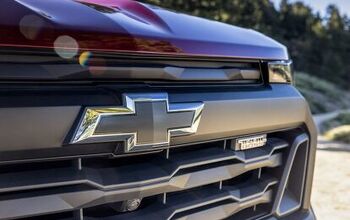Going Coastal: GM Calls for Nationwide Zero-emission Vehicle Strategy

General Motors CEO Mary Barra took to the USA Today op-ed page Friday to advocate for a national zero-emission vehicle strategy — NZEV, for short. The automaker is calling for the ZEV program already in effect in California and nine other states to become law across the United States, thus making it mandatory for OEMs to field a certain number of electric and plug-in hybrid vehicles, or pay a price.
Were the proposal to became the law of the land, you can only imagine the reaction from Ford’s rival in Auburn Hills.
GM revealed its wish in comments filed to the Safer Affordable Fuel-Efficient (SAFE) Vehicles Rule for Model Years 2021-2026 for Passenger Cars and Light Trucks, a proposal put forward by the Environmental Protection Agency and National Highway Traffic Safety Administration. The proposal would dial back existing corporate fuel economy standards, while stripping California of its ability to set its own fuel efficiency rules.
“General Motors anticipates the NZEV program, as recommended, has the potential to place more than 7 million long-range EVs on the road by 2030, yielding a cumulative incremental reduction of 375 million tons of CO2 emissions between 2021 and 2030 over the existing ZEV program,” the automaker wrote.
GM’s vision would be patterned on California’s ZEV rules, which assigns automakers a number of ZEV credits based on a percentage of non-ZEV vehicles sold. The automaker must then sell a number of ZEV vehicles matching the tally of credits, though it’s not a one-for-one ratio of credits to cars. Battery electric vehicles can warrant up to several credits apiece, depending on range, while plug-in hybrids count for anywhere from 1.3 credits to 0.4. Right now, the credit requirement is 4.5 percent, meaning an OEM’s sales volume would need to contain roughly 2.5 percent ZEVs. The rule goes up to 22 percent in 2025, or about an 8 percent ZEV sales mix.
The automaker’s proposal would have the national credit requirement start at 7 percent in 2021, “increasing 2 percent each year to 15 percent by 2025, then 25 percent by 2030.”
Automakers without many green vehicles would be able, as they do now in ZEV states, to purchase credits from automakers who’ve banked their excess credits. OEMs can also trade credits amongst each other. GM’s proposal would see the program terminated after meeting the 25 percent target, or if it was determined that battery cost or recharging infrastructure wasn’t sufficient to make the target feasible. That would give GM and other automakers an out.
Interestingly, the GM proposal also requests “Additional consideration for EVs deployed as autonomous vehicles and in rideshare programs.”
If this proposal seems to align well with GM’s electric car and autonomous vehicle plans, you’re not the only one noticing. That said, the government doesn’t have any requirement to make GM’s wishes come true.
“We believe in a policy approach that better promotes U.S. innovation and starts a much-needed national discussion on electric vehicle development and deployment in this country,” said GM executive vice president Mark Reuss in a statement. “A National Zero Emissions Program will drive the scale and infrastructure investments needed to allow the U.S. to lead the way to a zero emissions future.”
In her op-ed, Barra spoke of the need to mitigate the environmental impact of cars and congestion, saying the U.S. “can lead this transformation, particularly in electric and self-driving vehicles, but it requires collaboration by the private and public sectors, supported by comprehensive federal policies.”
Barra then proposed a series of initiatives designed to ensure the NZEV program’s success. Among them, infrastructure investments to help build a charging network, plus a renewal of the federal EV tax credit program. There was catnip, too. Barra said she would want to see “regulatory incentives” supporting American battery suppliers, then signed off with a warning about European companies turning domestic ones into uncompetitive technological laggards. Jobs, jobs, jobs, her writing whispered.
[Image: General Motors]

More by Steph Willems
Latest Car Reviews
Read moreLatest Product Reviews
Read moreRecent Comments
- Dave M. My sweet spot is $40k (loaded) with 450 mile range.
- Master Baiter Mass adoption of EVs will require:[list=1][*]400 miles of legitimate range at 80 MPH at 100°F with the AC on, or at -10°F with the cabin heated to 72°F. [/*][*]Wide availability of 500+ kW fast chargers that are working and available even on busy holidays, along interstates where people drive on road trips. [/*][*]Wide availability of level 2 chargers at apartments and on-street in urban settings where people park on the street. [/*][*]Comparable purchase price to ICE vehicle. [/*][/list=1]
- Master Baiter Another bro-dozer soon to be terrorizing suburban streets near you...
- Wolfwagen NO. Im not looking to own an EV until:1. Charge times from 25% - 100% are equal to what it takes to fill up an ICE vehicle and 2. until the USA proves we have enough power supply so as not to risk the entire grid going down when millions of people come home from work and plug their vehicles in the middle of a heat wave with feel-like temps over 100.
- Kwik_Shift_Pro4X Where's the mpg?


































Comments
Join the conversation
They worry about environment? Stop fracking, ethanol first
Sweetpotato: You should post here more often. There are legions of people who read this site who have limited knowledge of the facts and even more limited reasoning power.